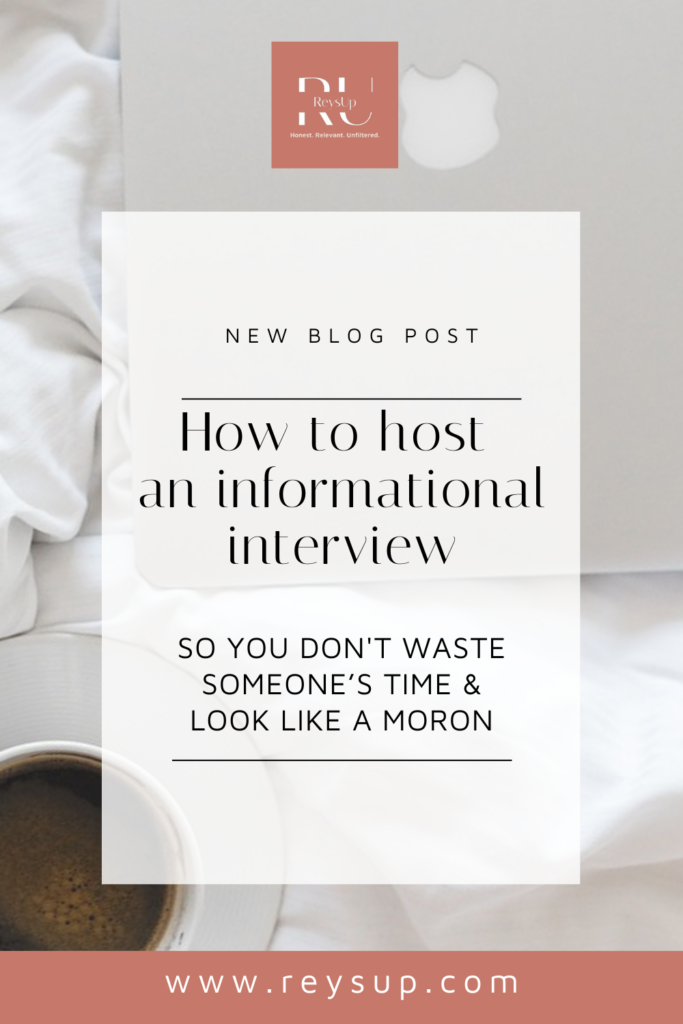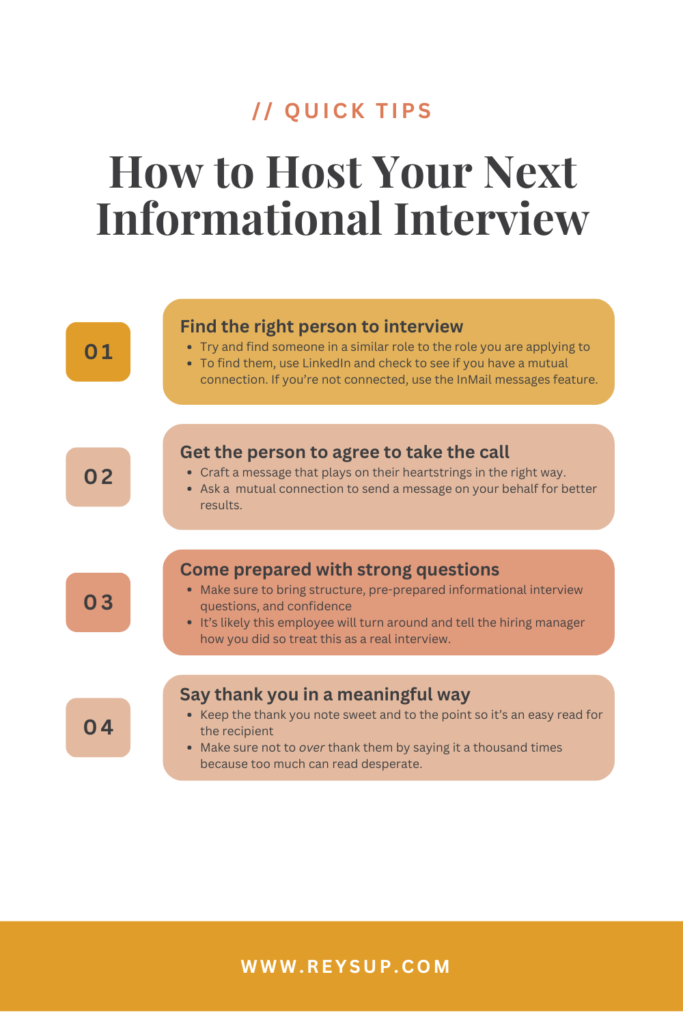In this article, I talk about how to schedule and host an informational interview along with share informational interview question. I provide a step by step process that anyone can use before they decide to apply to a company.
When job searching, one of the lowest lift, highest impact actions a job seeker can take is to ask for an informational interview from a current employee at the company at which they wish to work. In my opinion, this is one of the most critical steps a job seeker can take during the job search process, and is often one that is overlooked and underutilized. Keeping reading for my informational interview questions in step 3.
My suspicion is that people often skip it because they think it’s awkward. Reaching out to a complete stranger and asking them to take time out of their day to help you for no other benefit to them other than the satisfaction of knowing they are a nice person… is well… uncomfortable. Especially in today’s world where it feels like everything is transactional and nobody does a good deed unless there is a prize in return.
Before we get into why I think that is a load of crap, let’s first make sure we agree on what constitutes an informational interview.

Definition: Put simply, an informational interview is when a prospective candidate reaches out to a current employee at the target company and asks them a series of questions to get a better understanding of the company culture, team dynamic, and role expectations. It is also unofficially known as a forum in which two individuals can put aside the formalities of a proper interview and discuss the company in a more candid and open manner. Put even more simply, it’s a way to suss out if the job is what you think it is and make sure that you really want to work there.
Why do I love this? Well, the first and most obvious reason is because it allows you to uncover the truth. Assuming the person you choose to ask informational interview questions to is an unbiased party (meaning they are not motivated in any way to get you to either accept or decline the offer), you can likely trust that what they have to say is the truth… because what value would lying bring them? This means that you don’t have to worry about recruiting or a hiring manager painting a false picture of life to get you to take the offer. The person you interview is literally not motivated in any way shape or form to influence your actions.
The second reason I love this, and what most junior job seekers tend to miss, is that it actually reflects really strongly on the candidate and shows that the candidate is serious about the position. As a hiring manager, hearing that your prospective candidate went out of their way to find a member of your team, convince them to give up their time, and put themselves in a position to have another member of the team potentially evaluate them, is honestly impressive. Specifically, it shows that:
- You are serious about the job and really want it. A candidate that is only lukewarm interested in a role likely wouldn’t go through the effort of getting the chat on the calendar in the first place.
- You have sales drive and persuasive abilities. This is especially relevant if you are applying to a sales-type role. By taking this step, you are indirectly showing the hiring manager that you can sell (yourself).
- You take your career seriously and actually want to make sure the role is a good fit. What hiring manager DOESN’T want a growth-minded employee like this?
Alright, so now you’re hopefully convinced that this is a good idea. Now we need to talk about tactics of actually doing this. This includes sharing informational interview questions. Let’s break it down.
Step by step process to host an informational interview and informational interview questions

Step 1: Find the right person to interview
- This is definitely an art and a science. I always advise my clients to try and find someone in a similar role to the role you are applying to. For example, if you are applying to Salesforce as an account manager, don’t try and set up an interview with the VP of the group. Try and chat with another account manager on the team or a parallel team.
- To find these people, use LinkedIn. It is honestly the fastest and simplest way. Type the title of the role you are applying to and the company name in the search bar. This will split out current employees that are in the same (or similar) role at the company.
- Once you find a list of potential candidates, do one of two things:
- Option 1 (preferred): Click through the list and check to see if you have a mutual connection. Reach out to your mutual connection and ask for a warm intro via LinkedIn messages. This is preferred because when an official connection initiates the message, it goes straight to their normal inbox, and is therefore more likely to be seen and answered. Plus, if the intro is coming from a mutual connection, the recipient is more likely to agree to meet.
- Side note: As you get further along in your career, you will see that the number of mutual connections you have with individuals grows exponentially. This is why I ALWAYS recommend accepting invites, regardless of who the person is (that is assuming they are a normal, upstanding member of society. Please don’t accept creepy people). You never know when that person will cross your path again in the future.
- Option 2: If you notice that no one on the list is a mutual connection, don’t panic! LinkedIn allows you to send a message to someone you are not connected with via what is called “InMail messages”. The only catch here is that you must have a Premium LinkedIn account to send these messages. You also cannot message a LinkedIn member if they have turned off InMessages in their settings (but this is super rare). If you don’t have a Premium account, it’s very easy to upgrade in your settings. Read more here.
- Option 1 (preferred): Click through the list and check to see if you have a mutual connection. Reach out to your mutual connection and ask for a warm intro via LinkedIn messages. This is preferred because when an official connection initiates the message, it goes straight to their normal inbox, and is therefore more likely to be seen and answered. Plus, if the intro is coming from a mutual connection, the recipient is more likely to agree to meet.
Also Read effective LinkedIn Tips to Get Noticed and Enhance Your Professional Profile
Step 2: Get the person to agree to take the call
- This is where most people chicken out because like I said, it can feel uncomfortable. Here are a few words of wisdom to quell your fear:
- Believe it or not, most people are nice. And they also believe in paying it forward. For instance, I am a very busy professional, but never in my life have I ignored a person reaching out to me asking to take a 15 min informational interview.
- People have egos and love to talk about themselves. If you frame the ask in the right way, most people will jump at an opportunity to show off where they are in their career. It’s basic psychology.
- If you end up taking the job, they just gained followership from you, and that’s powerful in a tech company.
- Playing off of these three ideas, craft a message that plays on their heartstrings in the right way. Feel free to have your mutual connection edit and send the below template:
Hi XX – I hope you are well! I know it’s been some time since we last chatted but it looks like you are crushing it at [company name]. Congrats on [either a recent promotion you see on their profile or something as simple as such a successful ride at XX so far].
I wanted to reach out to introduce you to my former colleague and good friend [your name], copied on this note. [Your name] actually just applied for the XX role on your team.
[Your name] is eager to learn more about the team and hear first hand from someone on the team what life at [company name] is like. If your schedule permits, perhaps you two can find some time to connect in the next week or so. I’ll let [Your name] chime in to formally introduce herself, but hopefully you guys get a chance to chat. I really believe [Your name] would be an awesome addition to your growing team.
Thanks!
Step 3: Come prepared with strong informational interview questions
- This is an important step. Remember when I said earlier that asking for an informational interview “reflects really strongly on the candidate”? That can quickly change if you don’t come prepared. The worst – and I repeat worst – thing that you can do is come to an informational interview and piss off the employee by wasting their time. If you enter the chat without structure, prepared informational interview questions, and confidence, it’s likely this employee will just turn around and tell the hiring manager to pull your application. Remember – as informal as this is – it’s still technically an interview because it’s a direct reflection of you.
- Don’t worry though. The fact that you are reading this article right now means you are NOT going to come unprepared. Below are some sample informational interview questions I think are awesome to ask in an informational interview.
- What does “success” in this role look like to you?
- What is your favorite part about working on this team / at the company?
- What is the hardest part of your job or day?
- What does the growth trajectory typically look like?
- What does feedback and professional development look like at [company name]?
- What is [hiring manager’s name] management style like?
- If you had a magic wand, what is one thing that you would want to make your day to day job easier or more effective?
- What is the culture of the team / company?
- How is morale on the team? Are people generally really excited to work at [company name]?
- How many people on the team hit quota last quarter / month?
- How does the company respond to changes in the industry? Would you say the team is more proactive or reactive? Do you have any examples to share?
- Why do people stay or leave the company?
- What advice would you share for someone like me going through the interview process?
- Is there anyone else in the company / on the team that you would recommend I speak with?
- Would you be okay if I referenced your name in future interviews and let them know we connected?
- Depending on how much time you have, you should never ask more than 5-7 informational interview questions. You don’t want to make the individual feel like they are being grilled with informational interview questions. It is also your responsibility to manage the time and not go over. The last thing you want to do is make them late to their next meeting. If there is only 1 min left, don’t ask the next question. It’s not worth the risk of making them late.
Step 4: Say thank you (in a meaningful way)
- This may sound harsh, but in my opinion, if you don’t send a thank you note, you don’t deserve another interview. The thank you note should take you a maximum of 10 minutes to send, and I’ve even included a template for you to use below to say thanks for answering my informational interview questions.
Hi XX – Thank you again for the time yesterday. I really enjoyed our conversation, getting to know you, and learning more about life at [company name]. I particularly enjoyed learning about [insert something that you found interesting from your conversation to show that you were engaged and listening intently].
As mentioned on the call, I am excited about the potential opportunity to join the team at [company name]. It’s clear that you are passionate about what you are building, and it’s awesome to hear that you’ve had such a wonderful experience thus far.
Thanks again for everything. If you don’t mind, can you send me your Venmo? I would love to send you a small token of my appreciation and treat you to a nice cup of coffee to thank you for your time.
Last important callout. As much as this individual is doing you a favor, it is important that you also remain confident throughout the entire engagement. Absolutely thank them for their time, but don’t over thank them by saying it a thousand times because too much can read desperate. Sure, they are doing you a favor by answeing informational interview questions, but they should also feel lucky to get you as a potential teammate. Maintain that confidence throughout, and I promise you will surprise them. Good luck!
Looking for more interview questions? View our 52 Behavioral Interview Questions that comes with a free guide.




